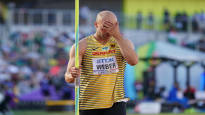The world athletics championships are concentrated in Europe, but the old continent’s own athletes are not doing well. Germany threatens to sink into a historically bad result, writes Atte Husu.
Atte Husu Sports reporter
will show the World Athletics Championships on its channels from August 19 to August 27. See the program and broadcast information of the games at this link.
Europe is the cradle of athletics.
What has been taken for granted throughout history is still completely true. From the analysis published on Urheilu’s website this weekend, it appears that nine of the ten countries that organize the most athletics competitions are from Europe.
France tops the list with 440 competitions. After that come the United States, 277, Portugal, 172, Italy, 165 and Finland, 162. The top ten are completed by the Czech Republic (147), Germany (146), Poland (145), Great Britain (139) and Spain (124).
The sample concerns the competitions organized from January 1, which are certified by the International Athletics Federation World Athletics – that is, those in which the athletes have been able to make performance limits and achieve ranking points for the World Championships in Budapest in August.
Although the culture of organizing the games on the old continent is still strong, the development of European athletics in medal statistics is moving in a worrying direction.
German discount mode
When the World Athletics Championships ended in Berlin in 2009, the host country Germany had enough reason to be satisfied.
Although the country’s athletes got only two gold medals, the total haul came to nine medals. It was the largest number in ten years and the overall result was better than the previous World Cup home games in Stuttgart in 1993.
Of Berlin’s nine medals, five came from the throwing events, two from the high jump and one from the heptathlon.
There was only one medal in the track events, the women’s 4×100 meter relay bronze. At the time, hardly anyone believed what kind of value the same relay medal could have for German athletics 13 years later.
At the 2022 World Championships in Eugene, Germany won two medals: in addition to the above-mentioned instant relay bronze, the fourth most successful country in the history of the World Championships in Athletics got into the gold and overall medal position only thanks to the length star Malaika Mihambon.
Suffering from injuries, Mihambo will not repeat his golden trick in a few weeks in Budapest. The German jumper has announced that this time he will have to miss the World Championships.
So far, the only crown jewel of the power house of European athletics is the top name of the decathlon season, a 23-year-old who is only preparing for the second adult competition of his career Leo Neugebauer.
Behind him, only the reigning European champion in the javelin can fit into the top three of the current season’s world statistics in his sport Julian Weberwho hasn’t been able to cross the 85-meter mark in recent weeks.
Ranked fourth in the world statistics in the high jump Tobias Potye has jumped 234, but his second-best result of the outdoor track season is only 227.
Germany has 11 athletes to send to Budapest who are in the top 10 in the current season’s world statistics for their sport, but none of them are absolute favorites to win their sport at the World Championships. Not even Neugebauer, who is studying in the United States and hasn’t competed since early June.
Germany has missed out on a gold medal at the World Athletics Championships once. This happened in Paris in 2003. At that time, however, the balance was four medals, silver and three bronze.
The United States is breaking Europe
Germany’s predicament at the World Athletics Championships is in itself a recent issue, as the team returned home from Doha 2019 with two gold and four bronze medals.
There will hardly be a quick fix in the coming years. Indications of this are given by the recently organized under-23 European Championships in Espoo, where Germany fell behind Finland not only in terms of medals but also in points.
The 20-22-year-old age group in question is the one that countries rely on the most when looking at the potential new winners of the adult championships in the next few years.
Let’s get to the problem of European athletics. At the same time that Germany is fighting for its existence as Europe’s biggest market in the medal statistics of the World Cup, the country had the best success at its home European Championships in Munich last August.
Something tells us that at last year’s World Championships in Oregon, which preceded the European Championships in Munich, the United States won 13 gold medals, while all European countries collected a total of 10 golds. The loss in the gold medals was already the second in a row for Europe: in Doha, the United States pulled out a longer victory, 14–11.
In the total number of medals, Europe remained ahead of the United States in Oregon, 42–34, but the lead is shrinking: in Doha, Europe still led by 47–29.
If the United States collects more medals than Europe alone in Budapest, we can talk about a disaster in the cradle of athletics.
What thoughts did the story evoke? You can discuss the topic on 4.8. until 11 p.m. Tunnus is required for commenting.
